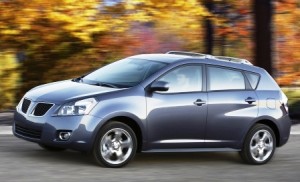General Motors Company has tested two Pontiac Vibe models this past Saturday at the Milford Proving Grounds in Michigan after several customers complained of sticking accelerator pedals, and found the brakes stop the vehicle in case of “unintended acceleration.”
“We ran the Vibe wide open at 60 miles an hour and the brakes were able to bring the vehicle to a safe stop within 169 meters, consistent with our internal requirement for brake performance,” said Martin Hogan, GM director of brake systems.
It is the same defense originally put forth by Audi, with little positive effect, decades ago when unintended acceleration allegations were widely publicized by television newscasts.
The 2009-10 Pontiac Vibe shares the basic platform of the Toyota Matrix crossover,and is as a result included in two the Toyota recalls related to unintended acceleration – one for sticking accelerator pedals and one for possible floor mat entrapment.
The Vibe was designed, engineered and manufactured by Toyota through August 2009 at New United Motor Manufacturing in Fremont California, according to GM. This GM-Toyota joint venture, post GM bankruptcy and amid ongoing Toyota global losses, is now in the process of being shut down by Toyota, even though California is its largest market.
It was unclear if the company had previously tested the Vibe for braking effectiveness under the same or similar conditions. We are unable, thus far, to discuss in detail the engineering protocols involved.
If both acceleration and braking are called for at the same time in the Matrix “drive by wire system,” Toyota does not over-ride the throttle.
GM say’s such a brake override input on the Vibe is unknown, since it did not engineer the vehicle, which means in our view it lacks what appears to be a common sense safety system. GM does have an algorithm that reduces the engine torque as needed when braking is applied in GM performance vehicles, such as the Corvette Z06 and Cadillac CTS-V. On other GM vehicles, the company maintains that its brakes are stronger than the engines and are able to stop the vehicles within a certain distance based on an internal requirement. (There will be much debate about this in the coming months, I’ll bet, at all makers not using such a system.)
GM says that in the “rare case” of a sticking throttle, a driver should apply the brakes firmly and steadily until stopped. Drivers are advise not to “pump the brakes,” which can deplete the available vacuum boost from the brake system.
Any customer who experiences any accelerator pedal issue should immediately park the vehicle, and have it towed to their GM dealer for an inspection, the company says.
Toyota this morning identified a repair for the Vibe, a shim that limits accelerator pedal travel, which will be installed by GM dealers in the case of the Vibe.
GM and Toyota are “sorting out “how soon parts will be available, GM said, as Toyota apparently continues to scramble to solve the sticking pedal problem among other quality and safety problems, which are coming forth.
Prior to the recall announcements, GM said it had not received any relevant customer complaints for the 2009-2010 Pontiac Vibe models. Nor were there any complaints found in a subsequent search of U.S. and Canadian databases, according to the U.S.’s largest automaker.
GM says that none of the complaints have resulted in a crash or injury.
GM will communicate with the approximately 99,000 Vibe owners in the United States and Canada as soon as additional information about the recalls is received from Toyota.


GM statement of 8 February 2010 – Ken Zino, editor.
Repair Parts Shipping to Dealers in Vibe Recall –
Repair parts for the sticking accelerator pedal condition in the Pontiac Vibe will begin being shipped to General Motors dealers this week (Feb. 8).
Letters to Vibe customers will be mailed Feb. 16 with instructions to contact their Pontiac dealer after Feb. 22 to have a precision-cut steel reinforcement bar inserted into the accelerator pedal assembly. The installation will take about 30 minutes but customers may need to leave their vehicles with dealers for a longer period of time.
Customers will receive a second letter when a remedy is available for the recall covering floor mat interference with the accelerator pedal. For now, customers are urged to take out any removable floor mat and place it in the trunk of the Vibe and not replace it with any other mat. Customers who choose against taking out the removable floor mat are encouraged to check the operation of the accelerator, brake and, if applicable, the clutch pedals to assure the floor mat does not interfere with them.